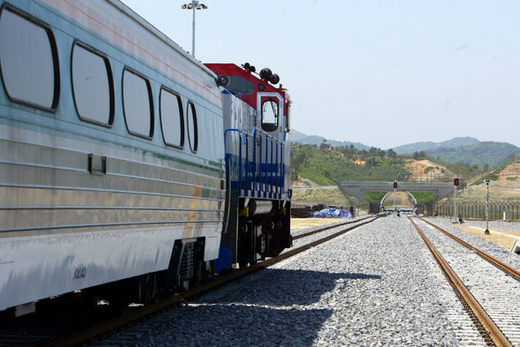 |
|
A train, which has been moved here for an inter-Korean test run, stands still at Jejin Station, Kangwon Province. Jejin/Yonhap News
|
Pyongyang cites 'unstable' political situation in South
North Korea yesterday abruptly called off today's scheduled test run of the cross-border railway that will travel from the South Korean border to Pyongyang, casting uncertainty over the entire inter-Korea transportation project. Experts believe the delay is part of a diplomatic tug-of-war between waged between the two Koreas regarding the railway project. The North cited "unstable political conditions" in the South, but at high-level military talks May 16-18 involving both sides, the North did not sign a pact to guarantee military protection for travelers on the line. South Korea's Unification Ministry had remained optimistic over the test run of the railway, assuring passengers their safety would be guaranteed. Experts say that North Korean military, upset about the South's unwillingness to discuss altering the Northern Limit Line that demarks the two Koreas' maritime rights, may have stymied the project. North Korean leader Kim Jong-il appears to have acquiesced to the decision. It is feared the delay in getting the railroad up and running will affect other inter-Korean exchange projects, including an economic cooperation meeting scheduled in early June, and a planned visit to Pyongyang by former president and Nobel Peace Prize laureate Kim Dae Jung in the same month.
Considering the North's record, such a last-minute cancellation is nothing unusual. In 2000, South Korea had to delay the historic inter-Korean summit one day later, to June 13, because of a last-minute request by the North. In March 2001 as well, joint ministerial talks were called off by the North. Pyongyang has cited many excuses for its cancellation of the talks, such as "lack of technical preparation," though experts say a more strident relationship between Pyongyang and Washington fueled the North’s decision to call them off.





